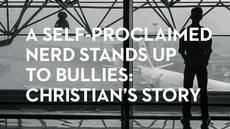Read Acts 6:8–8:3
And Stephen, full of grace and power, was doing great wonders and signs among the people. 9 Then some of those who belonged to the synagogue of the Freedmen (as it was called), and of the Cyrenians, and of the Alexandrians, and of those from Cilicia and Asia, rose up and disputed with Stephen. 10 But they could not withstand the wisdom and the Spirit with which he was speaking. 11 Then they secretly instigated men who said, “We have heard him speak blasphemous words against Moses and God.” 12 And they stirred up the people and the elders and the scribes, and they came upon him and seized him and brought him before the council, 13 and they set up false witnesses who said, “This man never ceases to speak words against this holy place and the law, 14 for we have heard him say that this Jesus of Nazareth will destroy this place and will change the customs that Moses delivered to us.” 15 And gazing at him, all who sat in the council saw that his face was like the face of an angel.
Acts 6:8–15
“The Times They Are a-Changin’”—this is the title of one of folksinger Bob Dylan’s most famous songs. In penning these words, Dylan identified with the social turmoil that existed at that time in the United States. This song has enjoyed a lasting legacy by capturing one of the constant realities of our life and world: change.
Change is exactly what has happened to Christianity in Western civilization. Christianity is no longer the dominant worldview in our culture, and identifying yourself as a Christian will not earn you a lot of social benefits. If anything, professing faith in Jesus may lead your peers to mock, jeer, or ostracize you.
Persecution in any form should not come as a surprise. Jesus was persecuted, and we should expect the same—in varying degrees—if we strive to live and love like him (John 15:18–19; cf. 2 Tim. 3:12). So the question is not if we will experience persecution but when. When it does occur, we can follow the example of Stephen, the subject of this week’s passage.
Stephen was considered to be a man “full of grace and power” who “was doing great wonders and signs among the people” (Acts 6:8). For proclaiming the gospel of Jesus Christ, he was disputed and lied about (Acts 6:9–15). Stephen didn’t stoop to their level. His response was not the result of willpower and determination but rather the grace of God and the empowering presence of the Spirit (Acts 6:8). He didn’t twist or change the message of the Bible but rather humbly, boldly, and graciously continued to proclaim its message.
Questions
- Stephen was falsely charged by the Jewish leaders, who claimed he said that Jesus would destroy the temple and change the customs of Moses (Acts 6:14). What was the significance of worshiping God at the temple? Why would worshiping at the temple no longer be necessary? (Read John 4:16–26.)
- Jesus said, “If the world hates you, know that it has hated me before it hated you” (John 15:18). Regardless of how great or small, have you experienced any level of persecution? What can we learn from Stephen’s example when facing persecution?
- How did the church respond to Stephen’s martyrdom and the persecution that ensued?
This devotion is adapted from the Acts Study Guide: Chapter 6–11. Pick up a copy today for only $9.99. The Study Guide includes an 11-week curriculum with small group studies, group inductive studies, as well as 55 daily devotions for your personal or family worship.















